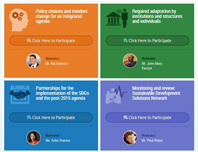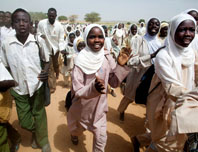DESA News
Volume 19, No.03 - March 2015
Capacity development
 The 2015 ECOSOC e-discussion takes place from 17 February to 17 March 2015 with the purpose of engaging policymakers, experts, practitioners and stakeholder groups in a global dialogue on specific aspects of the 2015 ECOSOC theme of “Managing the transition from the Millennium Development Goals to the sustainable development goals: What it will take”.
The 2015 ECOSOC e-discussion takes place from 17 February to 17 March 2015 with the purpose of engaging policymakers, experts, practitioners and stakeholder groups in a global dialogue on specific aspects of the 2015 ECOSOC theme of “Managing the transition from the Millennium Development Goals to the sustainable development goals: What it will take”.
The e-discussion consists of four concurrently running thematic windows, each led by an expert moderator. The thematic windows address:
- policy choices and mindset change for an integrated agenda;
- adaptation by institutions and structures;
- partnerships for the implementation of the SDGs and the post-2015 agenda; and
- monitoring and review.
Participants may join the e-discussion at http://www.unteamworks.org/amr2015
The e-discussion is co-ordinated and organized by UN DESA and UNDP in collaboration with the Sustainable Development Solutions Network (SDSN). UN DESA’s Office for ECOSOC Support and Coordination is leading the e-discussion for DESA, with substantive support provided by the UN DESA’s Division for Public Administration and Development Management.
For more information:
2015 ECOSOC e-discussion
 UN DESA’s Division for Public Administration and Development Management (DPADM) joins the 36th ‘African Association for Public Administration and Management’ (AAPAM) roundtable conference to conduct capacity building workshops in Rabat, Morocco, on 2-6 March.
UN DESA’s Division for Public Administration and Development Management (DPADM) joins the 36th ‘African Association for Public Administration and Management’ (AAPAM) roundtable conference to conduct capacity building workshops in Rabat, Morocco, on 2-6 March.
During the conference, DPADM will conduct two capacity building workshops and one e-Government Survey consultation. The first workshop will be attended mainly by the Members of the Africa Public Sector Human Resource Managers’ Network (APS-HRMnet) and will focus on ‘Strengthening Professionalism, Ethics, Integrity and Accountability in the Public Service for Sustainable Development in Africa’. It is aimed at promoting professional, ethical, and accountable delivery of public services in Africa.
The second one, focusing on ‘Effective Partnership between Ministers and Bureaucratic Leaders: From Policy to Implementation’, will be attended by Heads of Public Service and Cabinet Secretaries. Its major objective is to contribute to strengthening the capacity of political leadership and senior public service leaders in Africa, to carry out integrated and coordinated public policy formulation, decision, implementation, monitoring and evaluation.
The expected outcome of the workshops includes increased knowledge and awareness by political and administrative leaders in public sector institutions in Africa of the importance of integrated and coordinated policy formulation, implementation and monitoring, as well as evaluation by focusing on enhanced collaboration and partnerships between political leaders and senior public servants.
In addition, consultation sessions on the e-Government Survey will be conducted during the Roundtable Conference to update Africa’s Public Service Leadership on the developments in the use of information and communication technologies to conduct public governance and public administration and to solicit inputs for improvements in the next United Nations e-government survey.
For more information:
36th AAPAM Roundtable Conference
 DESA’s Statistics Division, in collaboration with the Economic Cooperation Organization and the Statistical Centre of Iran, is organizing a training workshop on the Compilation of Quarterly National Accounts for Economic Cooperation Organization Member Countries in Tehran, Iran, from 8 to 11 March.
DESA’s Statistics Division, in collaboration with the Economic Cooperation Organization and the Statistical Centre of Iran, is organizing a training workshop on the Compilation of Quarterly National Accounts for Economic Cooperation Organization Member Countries in Tehran, Iran, from 8 to 11 March.
The workshop aims to train national accounts statisticians on the methods and data sources that are available to compile current price and volume measures of quarterly gross domestic product, benchmark the quarterly estimates with the annual estimates and produce seasonally adjusted estimates. In addition, it will provide a forum for participants to share experiences in terms of improved data sources and methods as well as establish contacts.
For more information:
Training Workshop on the Compilation of Quarterly National Accounts for Economic Cooperation Organization Member Countries
 Second Meeting of the Expert Group on Environment Statistics will take place in New York on 25-27 March.
Second Meeting of the Expert Group on Environment Statistics will take place in New York on 25-27 March.
The Statistical Commission at its forty-fourth session in 2013 adopted the revised Framework for the Development of Environment Statistics (FDES 2013) as the framework for strengthening environment statistics programmes in countries and requested UN DESA’s Statistics Division to convene an Expert Group on Environment Statistics to collaborate with the division in the development of the necessary methodological tools to support the implementation of the FDES 2013.
The meeting will discuss and finalize (i) the draft methodology sheets of Volume I of the Manual for the Basic Set of Environment Statistics; (ii) Part I of the Environment Statistics Self-Assessment Tool (ESSAT) on institutional aspects; and (iii) Part II and III of the ESSAT on national priorities and data availability. Experts from developing and developed countries, as well as from international and inter-governmental organizations will attend the meeting.
For more information:
Calendar of events of UN DESA’s Statistics Division
 The Evidence and Data for Gender Equality (EDGE) project staff together with the staff of the African Development Bank (AfDB) visited the National Statistical Offices (NSOs) of South Africa and Swaziland in the first week of February to discuss South Africa’s and Swaziland’s contributions to the EDGE pilot data collection.
The Evidence and Data for Gender Equality (EDGE) project staff together with the staff of the African Development Bank (AfDB) visited the National Statistical Offices (NSOs) of South Africa and Swaziland in the first week of February to discuss South Africa’s and Swaziland’s contributions to the EDGE pilot data collection.
The EDGE pilot surveys in South Africa and Swaziland are supported by the AfDB. The team held detailed discussions with subject matter experts and extensively reviewed data collected by NSOs South Africa and Swaziland under different surveys, in order to assess which data items are already being collected on a regular basis that may be used to compile potential EDGE indicators on individual level asset ownership and entrepreneurship and which data items need to be newly collected under the EDGE pilots.
The EDGE-AfDB team assisted the NSOs in contextualizing the EDGE survey instruments and designing the samples for the pilots. Findings of the pilots are expected to inform the international methodological guidelines to be developed by the EDGE project on measuring asset ownership and entrepreneurship from a gender perspective.
For more information: The Evidence and Data for Gender Equality (EDGE)
 The 2015 ECOSOC e-discussion takes place from 17 February to 17 March 2015 with the purpose of engaging policymakers, experts, practitioners and stakeholder groups in a global dialogue on specific aspects of the 2015 ECOSOC theme of “Managing the transition from the Millennium Development Goals to the sustainable development goals: What it will take”.
The 2015 ECOSOC e-discussion takes place from 17 February to 17 March 2015 with the purpose of engaging policymakers, experts, practitioners and stakeholder groups in a global dialogue on specific aspects of the 2015 ECOSOC theme of “Managing the transition from the Millennium Development Goals to the sustainable development goals: What it will take”.
 UN DESA’s Division for Public Administration and Development Management (DPADM) joins the 36th ‘African Association for Public Administration and Management’ (AAPAM) roundtable conference to conduct capacity building workshops in Rabat, Morocco, on 2-6 March.
UN DESA’s Division for Public Administration and Development Management (DPADM) joins the 36th ‘African Association for Public Administration and Management’ (AAPAM) roundtable conference to conduct capacity building workshops in Rabat, Morocco, on 2-6 March. DESA’s Statistics Division, in collaboration with the Economic Cooperation Organization and the Statistical Centre of Iran, is organizing a training workshop on the Compilation of Quarterly National Accounts for Economic Cooperation Organization Member Countries in Tehran, Iran, from 8 to 11 March.
DESA’s Statistics Division, in collaboration with the Economic Cooperation Organization and the Statistical Centre of Iran, is organizing a training workshop on the Compilation of Quarterly National Accounts for Economic Cooperation Organization Member Countries in Tehran, Iran, from 8 to 11 March.
